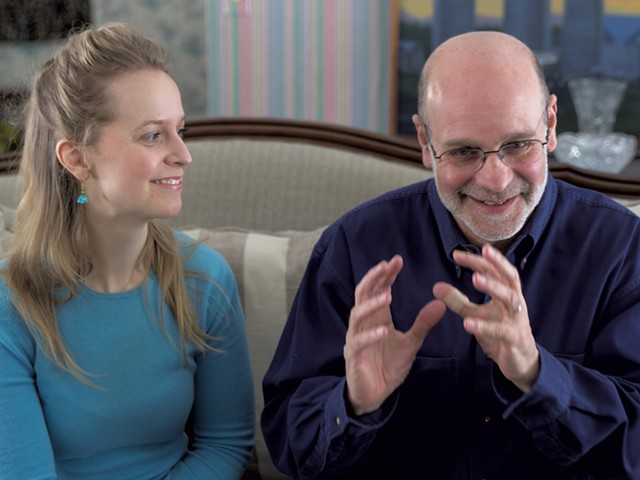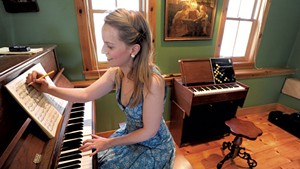
- Courtesy of Zach Zorn
- Mary Bonhag and Paul Orgel
In the midst of a cascade of national news about women opposing the policies of the President Donald Trump administration — a worldwide women's march, a sudden uptick in donations to Planned Parenthood, a surge in women considering running for office — comes a timely concert at the University of Vermont.
"How Do I Love Thee? 19th-Century Women in Song," this Thursday at UVM, features soprano Mary Bonhag, accompanied by pianist Paul Orgel, singing poems that are voiced from the perspective of women two centuries ago. Some were imagined by the likes of Elizabeth Barrett Browning and Emily Dickinson, others by male poets. The composers are women and men from the 19th century through today.
Orgel's last solo recital program, last summer, was an all-Mozart affair and a protest against the anti-Enlightenment sentiments of Trump's campaign. But he and Bonhag didn't envision current events when they began discussing the UVM program at that time. Indeed, said Orgel during a recent rehearsal with Bonhag at the pianist's Shelburne house, "No one knew Trump was going to get elected."
Bonhag, displaying more equanimity, focused on the program's origin. The concert is part of the UVM President's Concert Series, which is organized by Orgel and literature professor Tom Simone. In tandem with Simone's current class on romantic poetry, it aims to tackle a problematic but beautiful mainstay of the art-song repertoire: Robert Schumann's Frauenliebe und -leben (A Woman's Life and Love).
For pianists, the eight-part song cycle ranks "among Schumann's finest works," Orgel said, and gives equal weight to piano and voice parts. But sopranos find themselves singing a series of cringe-worthy, out-of-date vignettes in first person, by Adelbert von Chamisso, about a woman's love for a man through courtship, marriage, children and death.
"I want to serve and live for him ... [He is] remote — a wonderful, majestic sight! ... Let me bow my head in all reverence," read a few of the male-penned verses, according to one translation.
Some sopranos choose not to sing the work; Bonhag, who trained at Bard College under the partial tutelage of opera diva Dawn Upshaw, said she avoided the work for years. It was only after she married and had children that she began to see how "Anyone feels that way when they're falling in love." Bonhag performed the cycle for the first time last year at Scrag Mountain Music, the central Vermont chamber series that she and her husband, Evan Premo, run from their Marshfield home.
Despite making her peace with it, Bonhag vowed it will be her "lifelong project to offer counterweights" to Frauenliebe. The program she conceived for UVM includes two lieder by Clara Schumann, Robert's wife. A concert pianist, Clara was the breadwinner of the couple, performing continually despite having eight children. As a composer, she chose poems by Friedrich Rückert for the two songs Bonhag will sing, but those male-penned texts are slightly less "unfeminist" than Chamisso's.
The singer has also selected Franz Schubert's "Suleika I," with text by Johann Wolfgang von Goethe — or rather, published by Goethe under his own name. The poems were actually written by his love interest, Marianne von Willemer, as she revealed shortly before her death in 1860.
Because 19th-century composers generally chose to set men's poems to music, many female contemporaries of Goethe, Friedrich Schiller, Christian Johann Heirich Heine and the rest weren't honored with song until the 20th century and later. Bonhag has included several examples on the program: the living composer Libby Larsen's song cycle Sonnets from the Portuguese 6, which sets to music Browning's poems in direct response to Frauenliebe; and musical takes on Dickinson poems by four composers: Aaron Copland, Lori Laitman, George Perle and Lee Hoiby.
Reached by phone, Simone describes the program as "humane gender reflection." Women two centuries ago lacked a public arena, he says: "Married women had no property; there were limitations on money, opportunities, everything.
"We like to think there's been some kind of advance," Simone continues. "But since the last presidential election, we're in a very precarious position. We're being challenged by oppressively patriarchal forces. Everyone at the top [now] are white, male billionaires."
Orgel and Bonhag believe they are providing an antidote with this performance. Given the concert's checks and balances, said Orgel, "This is the antithesis of the spirit of what's going on."
Bonhag added, "As musicians, we have the ability to lift people out of that crap, to give them energy to go and make peace in the world. The value of music — especially music with words — is that it's the opposite of Trump."










Comments
Comments are closed.
From 2014-2020, Seven Days allowed readers to comment on all stories posted on our website. While we've appreciated the suggestions and insights, right now Seven Days is prioritizing our core mission — producing high-quality, responsible local journalism — over moderating online debates between readers.
To criticize, correct or praise our reporting, please send us a letter to the editor or send us a tip. We’ll check it out and report the results.
Online comments may return when we have better tech tools for managing them. Thanks for reading.